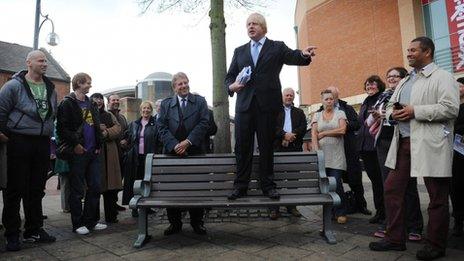Why Boris Johnson victory was crucial for Conservatives
- Published

The important thing for the Conservatives is not that Boris Johnson won. The important thing is that he did not lose.
If Ken Livingstone had been elected mayor of London, the risk is that the Conservatives would have been plunged into disarray.
For weeks ministers have told me privately that however bad the local elections were, they could at least rely on Boris being re-elected in the capital.
Asked what would happen if he did not win, they would shrug their shoulders and mutter darkly about meltdown and panic and headless chickens. "We would be in a different place then," said one.
So by winning, albeit by a narrow margin, Mr Johnson provides his party not just with electoral cover for a grim set of local election results, he also prevents the Tories descending into an outbreak of infighting the like of which they have not seen since opposition.
Many Conservative MPs are new, they have known only good times. The fear among some of the old guard, particularly those tempered by the dark days of the Major years, is that the new generation of MPs might begin to panic and cast around for new policies and, perhaps, even new leadership.
The Conservative right would push even harder for tougher policies on crime, immigration and Europe. A Queen's Speech focused on Lords reform would be unthinkable. And the party's modernisers around Mr Cameron would find themselves under siege as never before.
So Boris Johnson's victory does not mean the Tories are on track to win the general election. It does not allow the Tories to dismiss the results in the rest of the UK as mid-term blues. But his victory does mean the Tories do not face an existential debate about their future that few parties can survive in government.
'Makes people laugh'
For some Tories, success in London is proof that Boris Johnson's core Conservative policies work and should therefore be adopted by David Cameron. They talk of his support for lower taxes, his willingness to back bankers in the face of widespread public censure, and his readiness to take on Europe. They note his ability to cross party boundaries and win votes from across the electoral market.
But other Tories say, no, Mr Johnson's appeal comes not from his so-called authentic conservatism, but from his unique brand of personality politics that transcends party politics. They say he is popular with Labour and other voters, not because of his Tory values, but despite them.
On the BBC shortly before the result the pollster Peter Kelner paraphrased the song from the Sound of Music and declared, "Boris makes the people laugh".
For Londoners, victory for Mr Johnson means of course that there will be none of Ken Livingstone's promised fare cuts, extra police or help with child care. Instead, there is Mr Johnson's promise - note promise - of less waste at City Hall, fewer tube delays and fewer council tax rises.
And as for Boris Johnson himself, well he now has another four years in City Hall. That is four years when he is probably not a potential candidate for a Westminster by-election, four years when the speculation about his leadership ambitions can float harmlessly up the Thames.
But after four years, well, who knows. The important thing for the Conservatives is not that Boris won. The important thing is that he did not lose.
<bold>· All the latest election results are available at </bold> <link> <caption>bbc.co.uk/vote2012</caption> <altText>BBC Vote 2012 special report and results service</altText> <url href="http://www.bbc.co.uk/news/uk-politics-17270000" platform="highweb"/> </link>
- Published29 March 2012